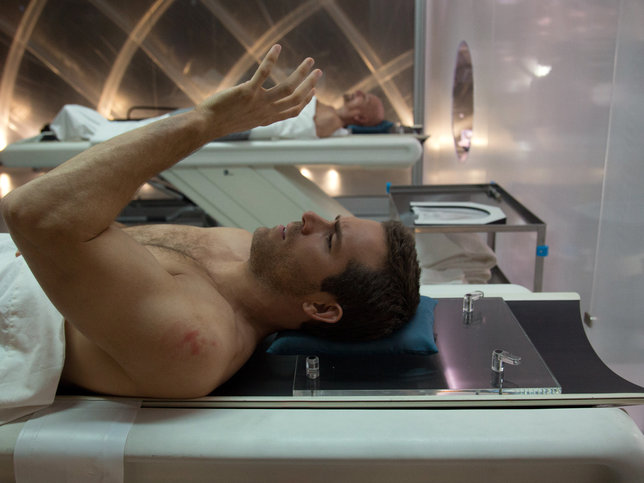Tarsem Singh has been called many things. Some movies have credited the acclaimed Indian-American director as just Tarsem; others have used his entire name Tarsem Singh Dhandwar. Ever since he began winning awards for his work on REM’s famed "Losing My Religion" music video, he’s been called a genius and a visionary, as well as pretentious and style over substance. But through the good ("The Fall") and the bad ("Immortals"), one thing you’ve never been able to call him is generic.
That is, until now with "Self/Less."
This is a man who spent about four years and much of his own money traveling the globe’s most outrageously beautiful locales in order to make his magnum opus "The Fall" (I mean, just watch the trailer). Now he’s standing behind the camera of an utterly anonymous movie, an impact-free immortality action-thriller that – much like the fresh if not quite new bodies being peddled in the film – seems "alive only in the most basic sense."
Real estate tycoon Damian Hale (a raspy and New York-accented Ben Kingsley) has a lot of a lot. He owns most of the city, has hyperbalillions of money that his estranged activist daughter (Michelle Dockery of "Downton Abbey") wants nothing to do with and lives in a gold-lined penthouse apartment that comes with its own built-in marble fountain. What he doesn’t have a ton of is time, as old age and disease have caught up with the mogul.
When you’re rich enough, however, even time can be negotiated with. Damian gets word of a new process called shedding, which can transport a person’s soul, memories and experiences into a younger, healthier body. Desperate, he undergoes the procedure and winds up in the handsome body of Ryan Reynolds plus a brand new identity – Edward Kidner – to go with it.
For a while, Damian has a blast partying off the new body smell down in New Orleans, but he soon starts having intense hallucinations of a different life – one where he’s a military man married to an unknown woman (Natalie Martinez) with a sick child (precocious little scene stealer Jaynee-Lynne Kinchen). His doctor Albright (Matthew Goode) insists the fever dreams are nothing, but nevertheless new-look Damian is soon on the lamb, trying to find out the backstory behind the body he now calls his own and quickly discovering he may have been tricked into buying pre-owned rather than brand new.
For "Self/Less," Tarsem’s signature lush and ornate visuals are pushed far into the background – an opulently decorated apartment, a traveling medical facility designed like the Domes, a flash of texture here or there – and then pushed a little further until his trademark style is barely a speck in the film’s horizon. To be fair, a little tightening on Tarsem’s reins isn’t totally uncalled for; in actual practice, his films are often outrageously capital-A Artsy, with things like story, logic and entertainment sometimes neglected in the process. Even at their worst, however, his movies showcase a completely unique vision that at least helps distract from any shortcomings.
Unfortunately, the screenplay for "Self/Less" – credited to David and Alex Pastor – comes with plenty of its own shortcomings, and Tarsem’s generic, workmanlike and in the end rather soullessly adequate approach to the material ("Looper," an infinitely better past project from the same production company, Endgame, seems to have served as the inspiration here, from the clean use of static shots and pans to even the plot’s rural detour) does little this time to cover those issues up.
There’s actually a lot of potential for this story – a wealthy man trapped inside another man’s body, with its former owner’s memories fighting to reclaim its existence – but "Self/Less" constantly undercooks and defangs all of its seemingly promising morality play. Damian’s decision about whether he should maintain his hold on his new body or die to let its former owner live again never seems to provide much moral or emotional intrigue; even though he’s defined in the early going as a minorly self-absorbed and throat-cutting businessman – and it’s still his life on the line – he never seems too conflicted with his choice.
Meanwhile, Martinez struggles with her wife character’s inconsistent and sudden mood shifts, going from panicked to relieved to appalled to weirdly cozy with her rented out husband. The script never makes much sense of her character’s confused reaction to the situation; her main story beats are fine, but how she ends up at each one is left woefully underdeveloped, emotionally or dramatically.
Much of that likely has to do with the pace of "Self/Less," which moves quickly – not in a good, brisk way but in an uninterested way. The film rushes into the business of "shedding" as though it’s a common, non-incredible thing and keeps that harried pace for much of the proceedings. Damian’s daughter subplot is given just a scene, despite serving as a key part of the story’s emotional core. Even the montages just seem hurried, conveying some energy but no real idea of the time elapsed or character development. It’s as though the movie itself is trucking along, just ready to dish out some action thrills and get itself over with.
Maybe a part of that been there, done that attitude is because the movie knows that we have, in fact, been there and done that with this rote, predictable story. Even if it wasn’t formula, "Self/Less" makes it pretty easy to pick up that Albright isn’t all to be trusted, from the ominous blue plastic labs to his foreboding small talk ("You’re not asking the right questions," for instance) to simply the fact that he’s British (never to be trusted in these kinds of genre films). If that wasn’t enough, the movie’s not exactly subtle with the hints; the first hallucination pretty obviously tells the audience exactly what’s up.
Otherwise, the film basically morphs into a standard fugitive chase movie with equally standard thrills. The action itself is actually pretty solid – even with some choppy, distracted editing and dumb moments, like characters idiotically galloping off to their own easily foreseen kidnapping or characters going from sickly to snapping villains’ limbs within a millisecond (Damian’s former body was conveniently one of those super efficient Jason Bourne-esque military-trained killing machines, because obviously). Still, when it comes to dudes punching dudes, firing guns – and flamethrowers! – and flipping cars, "Self/Less" gets the job technically done – with surprising brutality, as well.
Are those few modest sequences of visceral pop worth the muddled story, some hammy supporting performances and silly scenes featuring young Damian Googling "pumpkin" and awkwardly swimming with not his actual daughter? Not particularly.
The truly disappointing thing is that there are the makings of a good, interesting thriller within "Self/Less." It has a uniquely flashy director, a charismatic actor matched up with an Oscar-winning great and a story rich with potential. Yet with all of that, "Self/Less" manages little more than a short life expectancy in your memory.
As much as it is a gigantic cliché to say that one has always had a passion for film, Matt Mueller has always had a passion for film. Whether it was bringing in the latest movie reviews for his first grade show-and-tell or writing film reviews for the St. Norbert College Times as a high school student, Matt is way too obsessed with movies for his own good.
When he's not writing about the latest blockbuster or talking much too glowingly about "Piranha 3D," Matt can probably be found watching literally any sport (minus cricket) or working at - get this - a local movie theater. Or watching a movie. Yeah, he's probably watching a movie.







